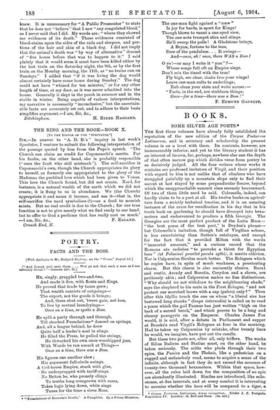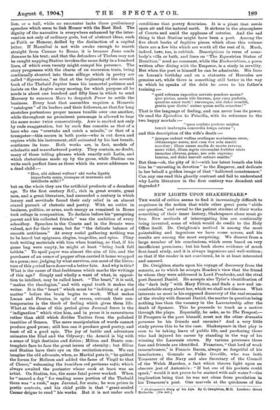THE first three volumes have already fully established Cho reputation
of the new edition of the Corpus Poetaruna Latinorum, and in accuracy and scholarship the present volume is on a level with them. Its contents, however, are immeasurably inferior, and yet to the literary student it has an interest of its own, for, perhaps, nowhere else can the depth of that often narrow gap which divides verse from poetry be so decisively judged. All the four writers whose works it contains are professed imitators of Virgil, and their position with regard to him is not unlike that of climbers who have struggled painfully up a mountain slope only to find their ascent at last stayed by some perpendicular fissure, beyond which the unapproachable summit rises serenely heavenward. Of two of them little need be said. Columella, indeed, can hardly claim to be a poet at all. His twelve books on agricul- ture form a strictly technical treatise, and it is an amazing instance of the craze for versification in his day that in his tenth book on gardening he should have diverged into hexa- meters and endeavoured to produce a fifth Georgic. The Georgics are the most perfect product of the Latin Muse- " the best poem of the best poet," is Dryden's phrase— but Columella's imitation, though full of Virgilian echoes, is less entertaining than Sutton's catalogue, and except for the fact that it provided Milton with the words " immortal amarant," and a curious record that the Romans ate radishes " to provoke a thirst for Egyptian beer" (ut Pelusiaci proritet pocula zythi), it merits oblivion. Nor is Calpurnius Siculus much better. The Eclogues which he copies have, in spite of much weakness, a penetrating charm. But this charm is also eminently elusive. Rural and rustic, Arcady and Boeotia, Corydon and a clown, aro perilously akin ; and Calpurnius makes no fine distinctions. " Why should we not withdraw to the neighbouring shade," says the shepherd to his mate in the First Eclogue, " and not protect our scorched brows with a cap (galero) only ? " Then after this idyllic touch the one on whom "a liberal sire has bestowed long shanks " (longa internodia) is called on to read a poem which the god Fannus has just written "high on the bark of a sacred beech," and which proves to be a long and clumsy panegyric on the Emperor. Charles James Fox would, it is said, after a debate in Parliament and supper at Brooks's read Virgil's Eclogues at four in the morning. Had he taken up Calpurnius by mistake, after twenty lines he would, we imagine, have put out the candle.
But these two poets are, after• all, only triflers. The works of Silius Italicus and Statius must, on the other hand, be taken seriously. The critic who plods through their two epics, the Punica and the Thebais, like a pedestrian on a rugged and melancholy road, seems to acquire a sense of the infinite, although in fact they do not exceed•the measure of twenty-two thousand hexameters. Within that space, how- ever, all the rules laid down for the composition of an epic are abundantly illustrated. Similes are introduced, like mile- stones, at due intervals, and at every combat it is interesting to surmise whether the hero will be compared to a tiger, a • Corpus Poetorum Latinorum, denuo recognitum. Edidit J. P. Postpate. Faseibulus IV. London : G. Bell and Sons. [9s. net.] • lion, or a bull, while no encounter lacks those preliminary speeches which seem to link Homer with the East End. The dignity of the narrative is everywhere enhanced by the inter- vention not only of ordinary gods, but of abstract ideas, such as Faith or Honour, deified by the distinction of a capital letter. If Hannibal is not wide awake enough to march straight from Cannae to Rome, it is because Juno sends Somnus to his tent; and that the defenders of Thebes may not be caught napping Statius invokes the same deity in a hundred lines, of which even twenty might compel his presence. The story progresses with the charm of an excursion train, being continually shunted into those sidings which in poetry are called "digressions," so that at the beginning of the seventh book of the Thebaid Jupiter loses his immortal patience and insists on the Argive army moving, for which purpose all he needs is about one hundred and fifty lines in which to send Mercury to summon Mars to despatch Favor to settle the business. Every host that assembles requires a Homeric "catalogue " of its leaders and their followers, so that for long stretches portentous proper names tumble over one another, while throughout no prominent personage is allowed to bear the same name twice consecutively. Awe is excited not only by rude exaggeration, but by such fine conceits as that of a hero who can "overtake and catch a missile," or that of a trumpeter—this occurs in both poets—who is cut down and expires while his instrument, still animated by his last breath, continues its tune. Both works are, in fact, models of scholastic and manufactured poetry. They contain, no doubt, many of those telling phrases which exactly suit Latin, and which rhetoricians made up by the gross, while Statius can write such perfect lines as these which its nurse addresses to a dead child :— " Hen, ubi siderei vultus? ubi verba ligatis imperfecta sonis, risusque et murmura soli intellects mihi ? "
but on the whole they are the artificial products of a decadent age. To the first century B.C., rich in great events, great men, and a great literature, had succeeded a century in which luxury and servitude found their only relief in an almost crazed pursuit of rhetoric and poetry. With no outlet in business, politics, or arms, such energy as remained in Rome took refuge in composition. To declaim before his "perspiring parent and his collected friends" was the ambition of every schoolboy. Speeches in the Courts and in the Senate were valued, not for their sense, but for " the delicate balance of smooth antitheses." At every social gathering nothing was to be heard but epigrams, elegies, tragedies, and epics. Pliny took writing materials with him when hunting, so that, if his game bag were empty, he might at least "bring back full tablets." To spoil paper was almost the aim of life, and the purchaser of an ounce of pepper of ten carried it home wrapped in a poem; nor, judging by what survives, can most of the litera- ture of this period have deserved a better fate. And why is this? What is the cause of that feebleness which marks the writings of this age ? Simply and wholly a want of what, in opposi- tion to intellect, may be called heart. " The heart," it is said, "makes the theologian," and with equal truth it makes the writer. It is the " heart " which must be " inditing of a good matter" before the brain begins to work. What makes Lucan and Persius, in spite of errors, outrank their con- temporaries is the throb of feeling which gives them life. What at the close of this period gives Juvenal force is the "indignation" which stirs him, and in prose it is earnestness rather than skill which divides Tacitus from the polished inanities of Seneca. The mere manipulation of words cannot produce good prose; still less can it produce good poetry, and least of all a good epic. The joy of battle and adventure animates the Iliad and the Odyssey; the Aeneid is big with a sense of high destinies and duties ; Milton and Dante con- template face to face the great issues of eternity ; but Silius and Statius have their eye on the recitation-room. We can imagine the old advocate, when, as Martial puts it, " he quitted the forum for Helicon and added the fame of Virgil to that of Cicero," welcoming the tumidum sed perinane crope:q- which always awaited the poetaster whose cook at least was an artist. On Status, too, the same fatal power worked. When he "named a day" for reading some portion of the Thebaid there was " a rush," says Juvenal, for seats ; he won prizes in poetic contests, and his chief pride is that " great-souled Caesar deigns to read " his works. But it is not under such conditions that poetry flourishes. It is a plant that needs open air and the natural earth. It sickens in the atmosphere of Courts and amid the applause of coteries. And the sad thing is that Statius' might have been a poet. Among the five short books of fugitive pieces which close this volume there are a few bits which are worth all the rest of it. Much, indeed, here, too, is rubbish. Descriptions in verse of some- body's villa or bath, and lines on "The Equestrian Statue of Domitian," need no comment, while the Eucharisticon, a poem written after dining with the Emperor, is a study in servility. But when the poet is himself he can be admirable. His lines on Lucan's birthday and on a statuette of Hercules are genuine art, while there is something still better in the way in which he speaks of the debt he owes to his father's training :— " quid referam expositos servato ponders mores ? gum pietas, quam vile lucrum, qua, cura pudoris, quantus amor recti rursusque, ubi duke remitti, gratis qute dictis ! ammo quam nulls senectus !"
That is the language of feeling, and can never lose its power. Or read the Epicedion to Priscilla, with its reference to the two happy mortals :— " quos conlato pectoro mixtos iunxit inabrupta concordia longs catena "; and this description of the wife's death :— " jamque cadunt vultus oculisque novissimus error, obtunsteque aures, nisi cum vox sola mariti noscitur ; ilium unum media de morte reversa mens videt, ilium a3gris circumdat fortiter ulnis immotas obversa genas, nee sole supremo lumina, sed dulci mavult satiare marito."
But then—oh, the pity of it !—with her latest breath she bids him be " unresting in devotion " to the Emperor, and dedicate in her behalf a golden image of that "hallowed countenance." Can any one read this ghastly contrast and fail to understand why Latin literature in the first century was decadent and degraded F NEW LIGHTS UPON SHAKESPEARE.*







































 Previous page
Previous page